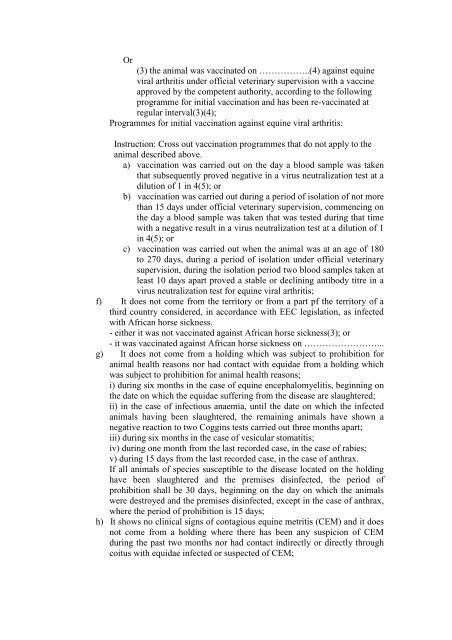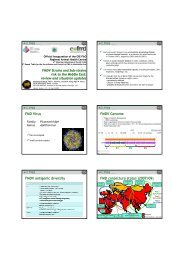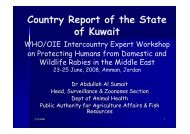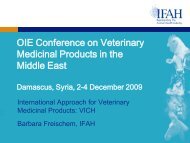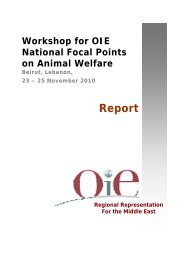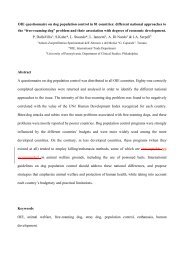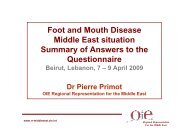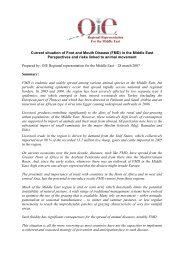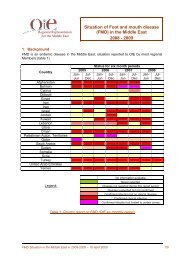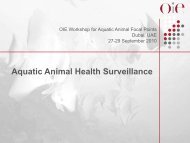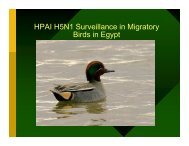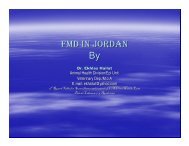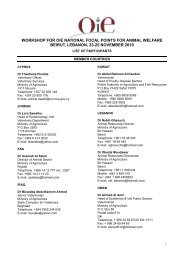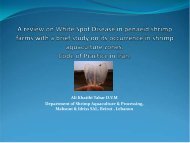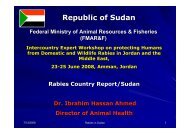HEALTH CERTIFICATE for export of registered horses ... - Middle East
HEALTH CERTIFICATE for export of registered horses ... - Middle East
HEALTH CERTIFICATE for export of registered horses ... - Middle East
- No tags were found...
Create successful ePaper yourself
Turn your PDF publications into a flip-book with our unique Google optimized e-Paper software.
Or(3) the animal was vaccinated on ……………..(4) against equineviral arthritis under <strong>of</strong>ficial veterinary supervision with a vaccineapproved by the competent authority, according to the followingprogramme <strong>for</strong> initial vaccination and has been re-vaccinated atregular interval(3)(4);Programmes <strong>for</strong> initial vaccination against equine viral arthritis:Instruction: Cross out vaccination programmes that do not apply to theanimal described above.a) vaccination was carried out on the day a blood sample was takenthat subsequently proved negative in a virus neutralization test at adilution <strong>of</strong> 1 in 4(5); orb) vaccination was carried out during a period <strong>of</strong> isolation <strong>of</strong> not morethan 15 days under <strong>of</strong>ficial veterinary supervision, commencing onthe day a blood sample was taken that was tested during that timewith a negative result in a virus neutralization test at a dilution <strong>of</strong> 1in 4(5); orc) vaccination was carried out when the animal was at an age <strong>of</strong> 180to 270 days, during a period <strong>of</strong> isolation under <strong>of</strong>ficial veterinarysupervision, during the isolation period two blood samples taken atleast 10 days apart proved a stable or declining antibody titre in avirus neutralization test <strong>for</strong> equine viral arthritis;f) It does not come from the territory or from a part pf the territory <strong>of</strong> athird country considered, in accordance with EEC legislation, as infectedwith African horse sickness.- either it was not vaccinated against African horse sickness(3); or- it was vaccinated against African horse sickness on ……………………...g) It does not come from a holding which was subject to prohibition <strong>for</strong>animal health reasons nor had contact with equidae from a holding whichwas subject to prohibition <strong>for</strong> animal health reasons;i) during six months in the case <strong>of</strong> equine encephalomyelitis, beginning onthe date on which the equidae suffering from the disease are slaughtered;ii) in the case <strong>of</strong> infectious anaemia, until the date on which the infectedanimals having been slaughtered, the remaining animals have shown anegative reaction to two Coggins tests carried out three months apart;iii) during six months in the case <strong>of</strong> vesicular stomatitis;iv) during one month from the last recorded case, in the case <strong>of</strong> rabies;v) during 15 days from the last recorded case, in the case <strong>of</strong> anthrax.If all animals <strong>of</strong> species susceptible to the disease located on the holdinghave been slaughtered and the premises disinfected, the period <strong>of</strong>prohibition shall be 30 days, beginning on the day on which the animalswere destroyed and the premises disinfected, except in the case <strong>of</strong> anthrax,where the period <strong>of</strong> prohibition is 15 days;h) It shows no clinical signs <strong>of</strong> contagious equine metritis (CEM) and it doesnot come from a holding where there has been any suspicion <strong>of</strong> CEMduring the past two months nor had contact indirectly or directly throughcoitus with equidae infected or suspected <strong>of</strong> CEM;


